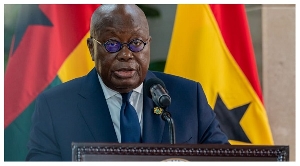Opinions of Thursday, 1 October 2015
Columnist: Nkunimdini Asante-Antwi
Docility, The Ghanaian and his “God” excuse
In August 2006, while on a bus trip back to Accra from Kumasi I met a lady who introduced herself as an Associate Professor of History at the Ohio State University. Our trip-long conversation was triggered by a controversial book I was reading at the time, The 48 Laws of Power, which she thought was “inconsistent with the Ghanaian nature”, she later posited.
“Inconsistent? Would you kindly explain that”, I interjected. Irate and intolerant of any insulting stereotype, I waited impatiently for a long thesis about African illiteracy and why she thinks my mere reading or a pretense of same, makes me an outlier. Finally she explained herself. “Ghanaians are very… (she paused) nice people”, she said. “Ghanaians are quite hospitable”, she continued. In her view, the principles espoused in the book I was reading would take that Ghanaian “innocence away from me.
“Interesting theory”, I thought to myself. Conscious of avoiding any negative self-talk, I hesitantly disagreed and provided anecdotal evidence of why I thought, and still think, that the Ghanaian hospitality mantra as she views it, is nothing short of a gimmick to boost international tourist traffic.
In support of my hypothesis, I narrated how a five-star hotel had treated African guest so shabbily but minutes after, had showered a Caucasian male visitor with a royal welcome, as if to say a black-skinned African is inferior to an Anglo-Saxon Caucasian same way the Malawian Kwacha trails the European Euro in value .
Over and over again I shared anecdotes and news reports that challenged the claim of “hospitality”. I did that not because I had lost my sense of patriotism but as a researcher and a participant observer of the phenomenon we were discussing, I felt the need to be intellectually honest. The truth hurts, but it eventually brings freedom.
What caused me to revisit this controversy, is the 30th September edition of the Citi Breakfast Show (CBS) on Citi 97.3 FM. The Citi breakfast team did a remarkable job by unearthing certain nervy cultural issues associated with the Ghanaian experience. Listener after listener, called into the show with harrowing tales of poor treatment usually by persons who hold themselves out to be professionals.
The central question, which I seek to address with this short piece, is this: why are Ghanaians are so docile and seem to accommodate even dehumanizing treatment by others, Ghanaians or foreigners? The evidence is anecdotal and indeed limitless; foreign airline staff, local bank tellers, Trotro “mates”, three-star hotel receptionists and even chop-bar waitresses, all seem to ride roughshod over the docile Ghanaian, whether in his own country or outside it.
This docility, that many cursory observers mischaracterize as “niceness” has wrought egregious damage in multiple spheres of the Ghanaian life; governance, democratic rights, religious freedom and consumer power, among others. And so I ask, why? Why are we the way we are? Why do our Nigerian brothers for instance, reject dehumanizing treatments and institutional incompetence when the “nice” Ghanaian would just grumble privately without being assertive? This is the research question that has guided my inquiry into the complex field of anthropology in my bid to appreciate the nuances of culture and human behavior.
This article is far from being a comprehensive and rigorous academic paper, but an opinion piece based on personal observation and insights gleaned from anecdotes.
“Fa Ma Nyame” – The “God” Excuse
Ghana is a very religious country by all standards. Sometimes one is tempted to believe that it is a positive development until the reality of our social, economic and political condition points to a façade that only the deluded would deny. Now understand this; that I put God in quotation marks because I believe misinterpreting scripture yields to one’s consciousness a deity who no longer is the true God but a deity of one’s theological misconstruction.
So when the Ghanaian interprets a scriptural verse that says “vengeance is mine, saith the Lord”, to mean that God forbids confrontation of any kind, with human injustice, institutional incompetence and social decadence, then I strongly argue that the “Fa Ma Nyame” syndrome is but a shirking of personal responsibility and at risk of rendering religion irrelevant to our social context. Supposing Dr. Kwame Nkrumah had said “Fa Ma Nyame”. Supposing Nelson Mandela had said “Let’s give apartheid to God”.
In fact, supposing the Hebrew King Jehoshaphat, according to biblical record (see 2 Chronicles 20) had only prayed and not acted, the writings of history would have been scribbled in sand and would have long faded. A balanced view of scriptural injunctions is a sure way of dealing with superstition and making faith relevant and responsive to our social condition.
The Family Tradition
Without gainsaying, some of our cultural values that we acquire through oral tradition and by operant conditioning, are useful and have helped create a society where by and large children are respectful of adults and of authority. I dare argue, unfortunately, that this very positive cultural attribute has established a psychological assumption that all adults and all authority are right, morally upright or competent in the exercise of their mandate or power under whatever circumstance. This singular assumption has been immensely challenged by our democratic polity.
Democracy assumes equal rights, but the Ghanaian culture subordinates one right to another. The child has no right to speak up against adult misbehavior. The employee has no “right” to speak up against the line manager or bad HR policies, lest he or she be tagged disrespectful and victimized. Those “small boys” in the media have no right to question political authorities because the boundary between culture and democracy is blurred to the advantage of the latter but at the detriment of the former. Thank God things are beginning to change as clear lines of demarcation are being drawn (especially by activist media houses such as Citi FM) between professional arenas and cultural spaces.
Except These Ones
This too, I have seen under the sun, that the history of civil and human rights activism almost invariably in all circumstances, were birthed by an uncompromising and assertive person, who refused to bargain with purveyors of human atrocity or social injustice, sometimes to their own existential peril. The likes Dr. Martin Luther King, Mahatma Gandhi, Dr. Kwame Nkrumah, Nelson Rolihlahla Mandela and indeed many others, carry one significant characteristic which formed the bedrock of their positive defiance.
They had conquered their fear of personal harm and succumbed to the romantic notion of being architects of social justice. It is hard to believe, that these venerable ancestors, while in the thickness of their struggle against injustice, may have contemplated a posthumous celebration in honor of their contribution to human progress, yet this honor is exactly what posterity confers and rightfully so.
I would dare say, an analogy such as what I have just stated is a useless exercise in abstraction, if useful lessons that fit our cultural context escapes mention. Since the Ghanaian is an individual, the instruction has to be targeted as such. And so what can each individual learn from the motivation and methods of those who changed the cause of human history?
Key Lesson – Respectful Confrontation
I posit a theory, that effective issue or policy advocacy and activism is done on the basis respectful confrontation. I can cite Tiger Eye, IMANI Ghana, Citi Breakfast Show and Adom TV’s morning show segment called “Fa Be Wo So” by Captain Smart, among others, who through carefully research and rational arguments, have been able to challenge powerful establishments to demand accountability. The reason why, in my view, these aforementioned organisations get measurable results is their method of operation that defy the typical Ghanaian approach of compromise, conciliation and indifference.
There is nothing “nice” and “Ghanaian” about confrontation. There is everything Nigerian about confrontation, when need be. Confronting issues head on is a cultural habit that every Ghanaian must adopt if there is going to be change in how we do politics, manage our families, practice our faith and discharge our professional obligations. It is not disrespectful to be assertive and direct. It is an asset if assertiveness and directness is practiced respectfully.
It is important to note that maintaining respect for all stakeholders without compromising the principles that inspired confrontation in the first place, is key to leveraging one’s credibility for popular support. This is where the over-enthusiastic ones miss it in their various spheres of endeavor. The fact that you are right does not mean you must be disrespectful of authority and disregardful of due process.
Conclusion
Leadership at levels of the Ghanaian society are culpable for the egregious economic and social injustice that is rampant in Ghana today. Our family units are in disarray, the church have veered off the mark, the political elite are drunk with the wine of corruption and the neo-imperialist are plundering on. The call by Prof. P.L.O. Lumumba for renewal and a recommitment to morality, duty and patriotism, is timely and befitting for the Ghanaian.
An attitude of assertiveness is an urgent imperative required to sanitize the space of public policy, consumer rights protection, religious sanctity and institutional incompetence. I wish to add my voice to the call by P.A.V.A Foundation and Citi 97.3 FM for an individual commitment.
We must all commit to be fair, diligent and truthful. Most importantly, we must commit to assert our rights and demand accountability from those who have been gifted with the blessing of stewardship in every sphere of endeavor. I so commit.
The author is a director of Metis Decisions LLC, a management consulting company in Ghana. He is also a motivational speaker, author and a personal development coach. Email: nkunimdini.asante@metisdecisions.com













